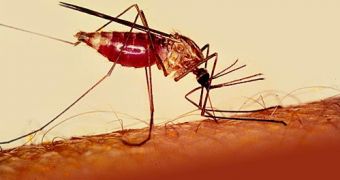500 million people in the tropics are infected by malaria, a disease caused by a protozoa spread by the female of the Anopheles mosquito. The parasite triggers fever, shivering, articulation pains, severe headache and vomit. Each year, 1.5 million people die of malaria, a child every 30 seconds.
It is endemic in 101 countries, mainly tropical, in Africa, Asia and America, and perhaps this one killed most people in history, of all infectious diseases. The malaria protozoa invades red blood cells and in some malaria types, the infected cells snare other healthy blood cells, forming "rosettes".
The parasite spreads during the rainy season, when the mosquitoes breed. No drug has complete effectiveness, as the parasite constantly mutates and there is no vaccine. It seems that the parasite has cloaking mechanism that hides infected cells from the immune system.
Now, a new research has found a meaning for the existence of the blood types (A, AB, B and O), explaining why the O type is dominant in most human populations: it defends against the most deadly type of malaria.
People with blood group O have a lower risk of dying from malaria but are more vulnerable to cholera and stomach ulcers, a model explaining how various diseases affected blood evolution, according to team at Edinburgh University, which published its research in the Proceedings of the National Academy of Sciences.
"I found it amazing that malaria and blood groups have been studied for over 100 years but no one had looked in detail at the effects of blood group on life threatening malaria in Africa, where most malaria deaths occur." said co-author Dr Alexandra Rowe.
"The discovery points to new avenues of research for drugs or vaccines which recreate the protection offered by this blood type, explaining that incidence of group O ranges from 40 % to 60 %, depending on the country." said Rowe. The team investigated Mali and Kenya children and discovered that those with blood type O were 70 % less likely to suffer of unrousable coma or life-threatening anemia.
A drug mimicking this effect could save lives "substantially - it's difficult to put a precise number on it because we didn't actually measure deaths, we measured life-threatening disease," she said.
The "rosettes" formed by the red blood cells can clog up minute blood vessels delivering oxygen to the brain and cause death. Proteins secreted by the parasite turn the red blood cells sticky, forming "rosettes", but group O red blood cells are more resistant from forming the rosettes.
Drugs or vaccines imitating this effect (breaking up the rosette) could significantly decrease severe or deadly complications of malaria.
"If we can develop a drug or a vaccine to reduce rosetting and mimic the effect of being blood group O, we may be able to reduce the number of children dying from severe malaria in sub-Saharan Africa." said Rowe.
There is one candidate drug for impeding the rosetting, but it also provokes bleeding.
"I hope a trial of this new approach to start within a few years, if funding can be found to back another generation of prototype drugs designed to overcome this side effect." said Rowe.

 14 DAY TRIAL //
14 DAY TRIAL //